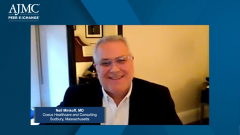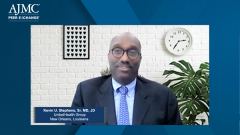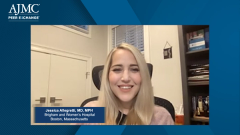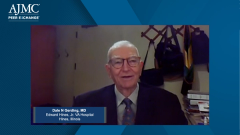
Treatment Guidelines and Recommendations for C. Diff Infection
Shared insight on the differences between ACG and IDSA/SHEA treatment guidelines for patients with clostridium difficile infection.
Episodes in this series

Transcript:
Neil Minkoff, MD: There are the ACG [American College of Gastroenterology] guidelines, and there are different guidelines for prevention, diagnosis, treatment, and multiple recurrences. Is that something you could walk us through a little to make sure everybody is on the same page?
Jessica Allegretti, MD, MPH: Yes. I was fortunate enough to work on the updated ACG guidelines, which just came out this year. We had the IDSA [Infectious Diseases Society of America] guidelines, which were updated back in 2018, and there was a big disconnect between those versions and the older ACG version. We wanted to sync up, look at the most recent data, and make good, informed statements and guidelines that clinicians could use. The big take-home points from the updated guidelines are: For primary C difficile [Clostridioides difficile], regardless of severity, metronidazole has fallen out of favor as a primary agent. The failure rates are too high, so it should only be used if you absolutely have no other option. Vancomycin [Vancocin] and fidaxomicin [Dificid] are both considered first-line agents, even with the updated IDSA guidelines—the addendum that was just published—and ACG is holding the stance that either vancomycin or fidaxomicin are considered good first-line agents.
When you get into recurrent infection, the pearl here is to do something different. If you used a standard course of vancomycin, think about an extended course of vancomycin or fidaxomicin. If you used fidaxomicin, think about an extended course of vancomycin. It’s really just not repeating what you had initially done that ultimately led to this primary recurrence.
Once you’re on the second or further recurrences, again utilize something you haven’t used, but start to think about fecal microbiota transplantation and refer for that. That’s now guideline recommended with good quality of evidence in the ACG guidelines, which differs from preventative agents. When you think about prevention of recurrence, you just heard Dr Gerding mention bezlotoxumab [Zinplava], which isn’t indicated for the treatment of C difficile, but prevention of further recurrences.
If you have a patient at any point in their C difficile journey whom you’re worried about recurring or you think is at a high risk of recurrence, you can consider utilizing this agent, which is a single IV [intravenous] infusion, paired with your anti-C difficile therapy, presumably an antibiotic, to prevent that subsequent recurrence. That’s generally how I think about the treatment paradigm. Once you’re on your second or subsequent recurrence—3 total episodes or more—you should be thinking about fecal microbiota transplantation because another round of antibiotics at that point is unlikely to work.
Neil Minkoff, MD: How do patients respond to the concept of fecal transplantation?
Jessica Allegretti, MD, MPH: I did my first one in 2012, and at that point there was a bit of hesitation. Now people seek this out. This is very well-known. It’s in the lay media. It’s on popular TV shows. It’s out there. People know what this is and there’s a sentiment that this is a safe, natural therapy. I don’t know that I agree that it’s safer than any of our standard medical therapies, but it’s certainly effective and safe. People come to me seeking this out, so I don’t get any side-eyed looks anymore if I make this recommendation. Patients want this therapy because we know that it yields a very high efficacy rate, patients feel better, and it prevents subsequent recurrences. We’re all eager to have FDA approved options that we can prescribe, and those are coming down the line. Patients are very open to this concept.
Neil Minkoff, MD: There are different guidelines. There’s an ACG guideline, but there’s also the IDSA guideline around treating recurrent episodes of C difficile. I want to make sure that we explore what the potential differences are so that our audience and the folks who are coming in to hear our conversation have a better sense of that. Dr Gerding, could you talk a little about the IDSA guidelines for treating recurrent C difficile and the recommendations for first recurrence vs multiple recurrences?
Dale N. Gerding, MD: Sure. One important concept in this guideline is that there are 2 levels of recommendations. The first one is worded “We suggest” and then there’s a second level of recommendation called “We recommend.” The “We suggest” recommendation carries only a conditional recommendation, whereas the “We recommend” is a strong recommendation. The wording of the new guideline is, “We suggest fidaxomicin over vancomycin for the treatment of first recurrence.” That’s causing a lot of confusion because it’s not a strong recommendation, it’s a conditional recommendation. The guidelines in the past have recommended both fidaxomicin and vancomycin as first-line therapies, as Dr Allegretti said. But the guideline writers this time recommended fidaxomicin, largely because of its sustained improved clinical response, a long-term lower recurrence rate. I wanted to clarify that because this is going to come up as payers and acquisition to fidaxomicin become an issue going forward with this new guideline.
It’s still in its very early days. It just came out this summer and everyone is still trying to digest exactly what this guideline is saying. For patients with multiple recurrences or experiencing their first recurrence, the recommendation is vancomycin. Vancomycin in a taper and pulse regimen is also an acceptable treatment for these first recurrences. For multiple recurrences, fidaxomicin is recommended again, as well as vancomycin taper and pulse regimens. Vancomycin followed by rifaximin [Xifaxan] is recommended for at least a third episode of C difficile, and fecal microbiota transplant is also recommended in these guidelines.
Then there’s also a recommendation for the use of bezlotoxoumab in high-risk patients for recurrence, and that is a “We suggest” recommendation, so it would be conditional. The level of evidence supporting these conditional recommendations is generally low or moderate at best. Whereas on a recommendation that carries a high certainty of recommendation, the data supporting that is generally high. That’s the difference, but the way they chose to write the language is a little different and may cause confusion going forward. You might ask, “What does it mean to say, ‘We suggest?’” They define it as, “Most people would do this recommendation, many would not.” You can interpret that any way you’d like.
Transcript edited for clarity.
Newsletter
Stay ahead of policy, cost, and value—subscribe to AJMC for expert insights at the intersection of clinical care and health economics.














